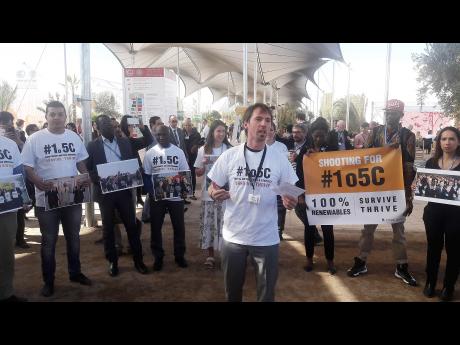Earth Today | Call for public engagement on IPCC Special Report On 1.5°C Temperature Rise
THE CALL for public engagement on the Summary for Policymakers (SPM) of the Special Report on Global Warming of 1.5 degrees Celsius is growing, near three weeks after the document was approved.
The report establishes that while it would be a steep climb to reach, global warming of 1.5 degrees Celsius is a significantly better goal option than two degrees, certainly for countries most vulnerable to climate change, including small island developing states. It was accepted on October 6, at the 48th session of the Intergovernmental Panel on Climate Change (IPCC) in Incheon, Korea.
“Internationally the report has been lauded as a major development. To me, there has been less uptake in the Caribbean, at least in the public space. I have only seen a few stories in the media,” observed Indi Mclymont Lafayette, managing director of Change Communications and one who has, for years, watched or otherwise participated in the global climate talks as a civil society advocate and journalist.
“I would still love to hear more from regional leaders and policymakers about what they will be doing concretely with the results of the report. For example, the United Nations climate change conference is going to be in Poland in December, how will Jamaica’s delegation and other CARICOM countries use this in their negotiating positions?” she added.
SOLUTIONS
To solve the problem, Lafayette suggests ensuring the incorporation of the report findings into Caribbean negotiating positions for the upcoming climate talks and hosting a series of public and stakeholder consultations on the report.
“This will also ensure stakeholder buy-in for implementing action,” she said, adding that the report could also be infused into existing climate change public education campaigns while also used to “resurrect” the successful ‘1.5 to Stay Alive’ campaign.
Jacqueline Spence, head of the Climate Branch of the Met Service and Jamaica’s focal point for the IPCC, also believes there is room for better engagement.
“I am not satisfied with the level of response,” said Spence, who helped to fight for the report’s acceptance in Korea.
“Next steps for me would have been an official launch of the report which includes policymakers who are the main users. Other public relations activities highlighting the contents and reason for the report are also possible,” she added
Upcoming meeting to feature report
An upcoming local meeting on the climate talks set for later this year is expected to feature the report, according to Spence.
“The report will be highlighted (but) not sure exactly what format it will take,” she said.
Efforts to get a comment from the Climate Change Division, the entity which leads on climate change mainstreaming in Jamaica, proved futile up to press time.
Head of the consultancy firm Environmental Solutions Limited, Eleanor Jones, for her part, urged government actors to first get themselves up to date on the findings.
“The government needs to become engaged with the report themselves. It is not just a report that has gone out there; it has significant implications in terms of government’s responsibility to protect the land, livelihood and people of Jamaica. So, engaging the private sector (and other stakeholders) is one thing, but they need to ensure the government itself is engaged and I am speaking not only of the leadership in terms of the policymakers, as well as the public servants,” she said.
Professor Michael Taylor, dean of the Faculty of Science and Technology and one of the drafting authors for the SPM, has, from the outset expressed his own disappointment with the response to the report while remaining hopeful that things would get better.
“Honestly, it is a little distressing that this report, which represents the bringing to fruition of a hard-fought battle by the Caribbean region, has emerged and yet has not received the kind of attention that it deserves, especially in comparison to the attention that the other countries have given it," he told The Gleaner two weeks ago.
"One would think that the Caribbean would make a big deal out of the fact that the stance and position they took has almost been vindicated by the scientific assessment in this report,” Taylor added.
The Caribbean and other small island developing states effort to have 1.5 degrees Celsius as the target for a cap in global warming dates back to at least the 2009 Copenhagen climate talks when a position paper was circulated, advancing 1.5 – and not two degrees – as the goal to strive for, given the implications for their long-term survivability.
GLOBAL COMMITMENT
Their subsequent years-long lobby, together with support from other developing countries, helped to secure the historic 2015 Paris Agreement which yielded the global commitment to “holding the increase in the global average temperature to well below two degrees Celsius above pre-industrial levels and pursuing efforts to limit the temperature increase to 1.5 degrees Celsius above pre-industrial levels, recognising that this would significantly reduce the risks and impacts of climate change”.
The IPCC was subsequently invited to prepare the special report on global warming of 1.5 degrees Celsius above pre-industrial levels and related global greenhouse gas emission pathways, in the context of strengthening the global response to the threat of climate change, sustainable development, and efforts to eradicate poverty.
The approved SPM presents the key findings of that report, “based on the assessment of the available scientific, technical and socio-economic literature relevant to global warming of 1.5 degrees Celsius” according to the IPCC.



